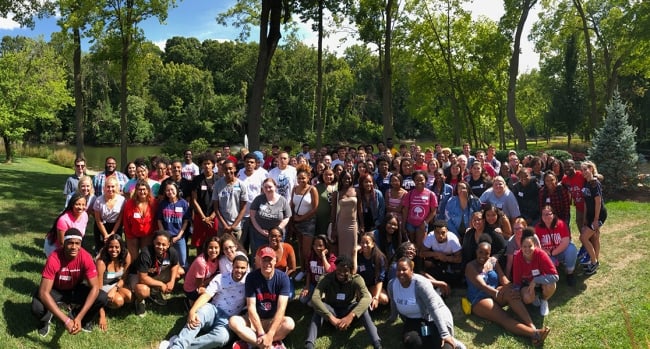You have /5 articles left.
Sign up for a free account or log in.

The University of Dayton provides wraparound support and services for high-achieving low-income students with the Flyer Promise Scholars program.
University of Dayton
Beverley Jenkins and Kathleen Henderson first stepped foot on the University of Dayton’s campus in 1977 and then never left. Henderson jokes they started working at the Ohio-based institution “back in the Stone Age.”
“It’s been home, and it’s been a place where I’ve just chosen to spend my career,” Jenkins says.
Jenkins and Henderson are UD alumnae and for the past 42 years have spent their time in student-facing services. Now, Henderson is the director of student engagement and associate director of the Office of Student Success, while Jenkins is director of student enrichment and academic outcomes.
They also both serve as success professionals for 140 or so students in the Flyer Scholars Program, promoting success in academics, career ambitions and life goals for low-income scholars from the area.
Success pros are born: The Success Professionals initiative launched in 2016, alongside the Flyer Promise Scholars program, and Jenkins and Henderson have been the sole two professionals since the start.
Henderson compares their roles to a GPS. “We help provide guidance or help students to navigate. We’re not academic advisers—we don’t cross into that role. But we become experts or attempt to become experts in the individual to help them reach their full potential.”
The Flyer Promise Scholars program provides Pell-eligible students from partnering high schools or regional programs who show academic promise with scholarship funds and wraparound services. The program includes a summer experience, mentorship, workshops, a mini course and leadership opportunities.
The two professionals split up the scholar cohort almost evenly between themselves—Henderson advises students pursuing a bachelor of science and Jenkins advises those pursuing a bachelor of arts or education. Flyer Promise Scholars admits around 40 students per cohort, so there are around 160 enrolled during any given academic year.
How it works: Flyer Promise Scholars are required to meet with their success professional at least once per term, and for some students, those eight visits are the only interactions they need during their four years. “But there are others that are at our door every other day. It just depends,” Jenkins says.
During a scholar’s first year, success professionals are very involved in their life, helping map out a plan for the next four years and encouraging them. As students move through the grade levels, the support becomes more hands-off, with professionals checking in about how they’re doing and their goals.
“By that time, they recognize we’re always there for them, should they need it,” Henderson says. “Also, we recognize that they have grown in many ways that are pretty capable of achieving.”
Scholars can face a variety of barriers in navigating higher education, whether that’s learning hidden curricula or fighting impostor syndrome, but Henderson and Jenkins work alongside them to find the right resources or coach them through tough times.
“Being Pell-eligible students, [scholars] may come from families where college has not been a part of their experience, there may be some socioeconomic barriers that happen,” Henderson says. “So we not only work with the students, but we also try to educate the families so that they can understand how college works and provide support for their students.”
In addition, the success professionals track students’ grades and credits to make sure they’re on the path to graduation, ensure students are in good standing with the university and encourage engagement.
The heart behind it all: Jenkins and Henderson were both first-generation college students at the University of Dayton, and it drives their work today, they share.
“When I look back at my experience as an undergrad here at UD, all those layers of support were not in place, and to be able to be a resource, to help remove barriers that may get in the way of a student’s success, it’s rewarding for me,” Jenkins says.
“We remember those pitfalls, those challenges,” Henderson says. “I frequently remember—they didn’t have a word for it back in 1977, when I started at UD—as a student, feeling like an impostor. And the impostor syndrome for many of our students is very real.”
Of the 230-plus scholars who have participated in the program at the University of Dayton, 92 percent have graduated in four years, thanks to the services and support from the university and their success professionals.
“We graduate right next to them, you know—we’re right by their side,” Jenkins says. “That’s what we’re here to do.”
Seeking stories from campus leaders, faculty members and staff for our Student Success focus. Share here.




